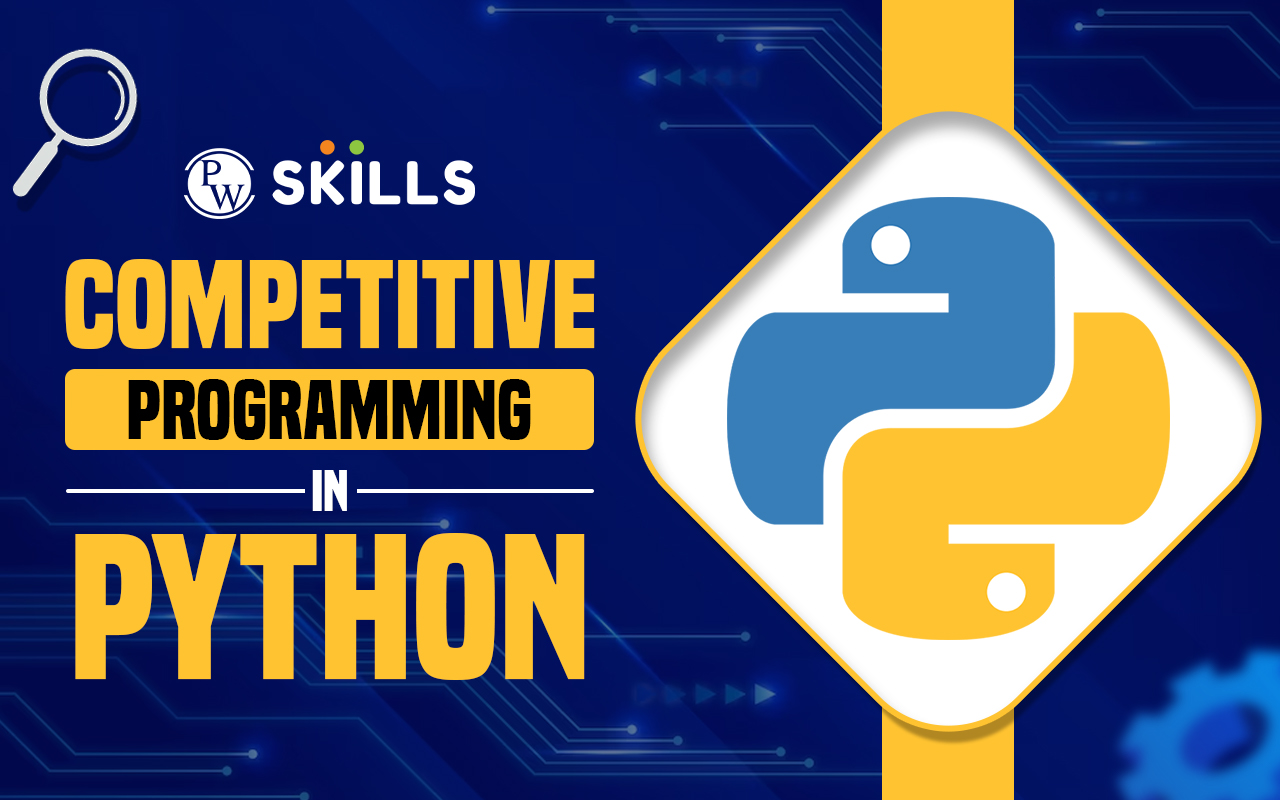Master the skill of Competitive Programming in Python. Learn about efficient algorithms, data structures, and coding practices tailored for success in competitive coding. Keep reading for more!
Competitive Programming in Python: Python is an excellent option for programming in Competitive Programming. First off, it’s easy-to-understand and concise grammar enables quicker development and simpler debugging. Python’s vast library offers many modules and functions for solving programming problems efficiently.
Python flaunts dynamic typing, intelligent memory management, and sophisticated data structures, hastening development and simplifying coding.
If you want to pursue a career as a coder, the PhysicsWallah’s Decode Java + DSA 1.0 course is just what you need in your career. Our course will teach you everything needed to succeed as a coder and stay ahead of your competition in the industry. So, don’t wait! Apply the code – READER at checkout and get an exclusive discount!

Also read: Selection Sort in C, C++, Java, Python with Examples
How to Start Competitive Programming in Python?
Starting competitive programming in Python can be a rewarding journey. Here’s a step-by-step guide to help you get started without providing actual code:
- Understand the Basics of Python: Ensure you have a good grasp of the basics of Python programming. Familiarise yourself with data types, control structures, functions, and basic input/output operations.
- Learn Standard Libraries: Explore Python’s standard libraries, such as collections, maths, and heapq. These libraries often contain efficient implementations of standard algorithms and data structures.
- Algorithms and Data Structures: Build a strong foundation in fundamental algorithms and data structures. Focus on topics like arrays, linked lists, stacks, queues, trees, graphs, sorting, searching, and dynamic programming.
- Online Platforms: Choose an online competitive programming platform like Codeforces, LeetCode, or HackerRank. These platforms offer a variety of problems ranging from easy to challenging.
- Solve Problems: Start solving problems regularly. Begin with easier problems to build confidence and gradually move to more complex ones. Analyse the solutions of others to learn different approaches.
- Compete in Contests: Participate in online coding contests regularly. Platforms like Codeforces and AtCoder host regular contests that provide a timed environment similar to real coding competitions.
- Time Management: Practice time management during contests. Learn to prioritise problems based on their difficulty and your familiarity with specific algorithms.
- Debugging Skills: Develop solid debugging skills. Competitive programming often involves working under time constraints, so being able to identify and fix errors quickly is crucial.
- Optimization Techniques: Explore optimization techniques. Learn how to optimise your code for time and space efficiency. This includes understanding algorithmic complexity and improving your code’s performance.
- Read Editorials: After attempting a problem or contest, read the editorials and solutions provided by others. Understand different approaches and learn from more experienced programmers.
- Join a Community: Engage with the competitive programming community. Join forums, social media groups, or online communities where you can discuss problems, share insights, and learn from others.
- Continuous Learning: Stay updated on new algorithms and techniques. Competitive programming is a dynamic field, and there’s always something new to learn. Follow blogs, read books, and attend webinars to stay informed.
Remember, the key to success in competitive programming is consistent practice and a willingness to learn from both successes and failures. Stay persistent, challenge yourself with increasingly complex problems, and enjoy the problem-solving journey!
Recommended Technical Course
- Full Stack Web Development Course
- Generative AI Course
- DSA C++ Course
- Java+DSA 1.0 Course
- Data Analytics Course
- Data Science with ML 1.0 Course
Tips for Improving Competitive Programming in Python
Competitive Programming in Python is a mentally demanding sport that requires a combination of problem-solving skills, algorithmic thinking, and efficient coding. To excel in this field, consider the following tips for continuous improvement:
- Build a Strong Foundation: Start with a solid understanding of programming fundamentals. Ensure you are proficient in data structures, algorithms, and problem-solving paradigms. This foundation is essential for tackling complex problems efficiently.
- Practice Regularly: Consistent practice is the key to improvement. Dedicate a specific amount of time each day to solving problems on online platforms. Regular practice enhances your problem-solving skills and builds muscle memory for common algorithms.
- Systematic Learning: Break down your learning into systematic phases. Focus on specific topics or categories of problems, mastering them before moving on to more advanced concepts. This helps in a structured and comprehensive understanding of the subject.
- Participate in Contests: Actively participate in coding contests on platforms like Codeforces, AtCoder, and LeetCode. Contests provide a simulated competitive environment, helping you develop the ability to solve problems under time constraints.
- Analyse Mistakes: After solving problems or participating in contests, thoroughly analyse your mistakes. Understand the reasons behind incorrect solutions and explore alternative approaches. Learning from mistakes is a powerful way to improve.
- Read Editorials and Solutions: Don’t just solve problems; also read editorial solutions and other participants’ approaches. Exposing yourself to diverse strategies broadens your problem-solving toolkit and helps you understand different algorithmic techniques.
- Learn to Manage Time: Time management is crucial in competitive programming. Practice solving problems within tight time constraints to improve your ability to make quick decisions and prioritise tasks during contests.
- Optimise Your Code: Develop the habit of optimising your code for time and space efficiency. Understand the time complexity of your algorithms and look for ways to make your code more concise and readable.
- Explore Advanced Topics: Once you are comfortable with the basics, delve into advanced topics like dynamic programming, graph theory, and advanced data structures. Broadening your knowledge base enables you to tackle a wider range of problems.
- Join Online Communities: Engage with the competitive programming community through online forums, discussion groups, and social media. Participate in discussions, ask questions, and learn from the experiences of others.
- Teach Others: Teaching is a powerful tool for learning. Share your knowledge by explaining concepts to others, whether through blogs, tutorials, or mentoring. Teaching reinforces your understanding and helps solidify your learning.
- Stay Updated: Competitive programming evolves, and new techniques and algorithms emerge. Stay updated with the latest developments by following blogs, attending webinars, and reading books on algorithms and data structures.
- Balanced Learning: While it’s essential to focus on competitive programming, maintain a balanced approach to learning. Explore other areas of computer science and programming to become a well-rounded developer.
- Set Realistic Goals: Define realistic and achievable goals. Break down your goals into smaller milestones, and celebrate your achievements along the way. This approach keeps you motivated and focused on continuous improvement.
- Enjoy the Process: Competitive programming is challenging, but it’s important to enjoy the process. The joy of solving complex problems and the sense of accomplishment are valuable rewards. Embrace the journey of continuous learning and improvement.
Also read: Python for Data Analysis
Pros of Competitive Programming in Python
Using Python for Competitive Programming (CP) offers several advantages that contribute to a smoother and more efficient coding experience:
- Readability and Conciseness: Python’s syntax is clean and readable, allowing programmers to express complex ideas with fewer lines of code. This makes it easier to understand, write, and debug algorithms quickly during time-constrained coding competitions.
- Rapid Prototyping: Python is known for its quick development cycle, enabling programmers to prototype and test ideas rapidly. In CP, where time is critical, this can be a significant advantage for implementing and refining algorithms swiftly.
- Extensive Standard Library: Python comes with a comprehensive standard library that includes modules for various data structures, mathematical operations, and utilities. This eliminates the need to implement specific functionalities from scratch, saving time and effort in CP tasks.
- Dynamic Typing and High-Level Abstractions: Python’s dynamic typing allows for more flexibility and its high-level abstractions simplify the implementation of algorithms. This reduces the cognitive load on programmers, enabling them to focus more on the problem-solving aspect of CP.
- Community Support: Python has a large and active community that contributes to its ecosystem with libraries, frameworks, and educational resources. This support is valuable in competitive programming, where access to a wealth of pre-existing solutions and discussions can aid in learning and problem-solving.
- Interactivity: Python’s interactive shell facilitates exploratory programming. Programmers can quickly test snippets of code, experiment with different approaches, and debug on the fly. This interactivity is advantageous in the fast-paced environment of coding competitions.
- Portability: Python is platform-independent, meaning code written in Python can run on different operating systems without modification. This portability is convenient for CP contests where the coding environment may vary.
- Availability of Online Judges and Platforms: Many online judges and competitive programming platforms, such as Codeforces and AtCoder, support Python. This ensures compatibility with the evaluation systems used in competitions, allowing Python programmers to participate seamlessly.
- Growing Popularity in the CP Community: Python’s popularity is steadily increasing in the competitive programming community. More and more participants are using Python, leading to a growing pool of resources, discussions, and shared Python-specific tips and tricks.
Also read: What’s the Difference Between Python and Other Languages?
Cons of Competitive Programming in Python
While Python is a popular and versatile programming language, it has some drawbacks when it comes to competitive programming (CP). Here are some cons to consider:
- Slower Execution Speed: Python is an interpreted language, and its execution speed is generally slower than compiled languages like C++ or Java. In time-sensitive competitive programming contests, where efficiency is crucial, Python’s slower speed can be a disadvantage.
- Memory Consumption: Python tends to have higher memory consumption compared to languages like C++. This can be a concern when dealing with large datasets or when optimising for space complexity, which is vital in some competitive programming scenarios.
- Global Interpreter Lock (GIL): Python’s Global Interpreter Lock (GIL) limits the execution of multiple threads at the same time. In scenarios where parallel processing is crucial for performance, the GIL can be a hindrance, making it challenging to utilise multi-core processors fully.
- Limited Support for Low-Level Manipulation: Python is designed for simplicity and readability, which means it abstracts away low-level details. While this is an advantage for many applications, it can be a drawback in competitive programming, where direct control over memory and low-level manipulation is sometimes necessary for optimization.
- Less Common in Competitive Programming Community: While Python is gaining popularity in competitive programming, many participants still prefer languages like C++ due to their performance advantages. This can result in a smaller pool of available resources and discussions tailored explicitly to Python in the competitive programming community.
- Reduced Control Over Data Structures: Python’s built-in data structures, while convenient, may not provide the same level of control and customization as manually implemented structures in languages like C++. This limitation can be a drawback when fine-tuning data structures for specific algorithmic needs.
- Compatibility Issues: Some competitive programming platforms and online judges might have compatibility issues with certain Python features or versions. This can lead to unexpected errors or difficulties in running Python code in specific environments.
Despite these drawbacks, many programmers still choose Python for its readability, ease of use, and rapid development capabilities. It’s essential to weigh the pros and cons based on the specific requirements of a given competitive programming scenario and personal preferences.
In some cases, the advantages of using Python outweigh its limitations, depending on the nature of the problems being solved and the importance of execution speed in a particular context.
While Python offers readability and ease of use, its slower execution speed, higher memory consumption, and limitations in low-level control may pose challenges in competitive programming. The Global Interpreter Lock and a smaller Python-focused community further contribute to its drawbacks.
Programmers must carefully consider the nature of contests and optimization requirements, balancing Python’s advantages with its limitations. Ultimately, the choice between Python and other languages depends on the specific demands of the competitive programming context and personal preferences, recognizing that each language has its trade-offs in the pursuit of algorithmic efficiency.
Also read: Java Or Python: Which Language Should You Learn in 2023?
FAQs
Why choose Python for Competitive Programming?
Python's concise syntax and extensive libraries make it an excellent choice for competitive programming, allowing quick implementation of algorithms and easy debugging.
Is Python slower than other languages for competitive coding?
While Python may be slower than languages like C++, its readability and ease of use often outweigh speed concerns, making it a popular language for competitive programming.
How can Python handle time constraints in competitions?
Python's built-in libraries, such as heapq and collections, coupled with efficient algorithms, enable Python programmers to meet time constraints effectively in competitive coding challenges.
Are there any limitations to using Python in competitive programming?
Although Python is versatile, some competitive platforms favour languages with lower-level memory control like C++. However, Python's simplicity and productivity advantages often make it a preferred choice for algorithmic problem-solving.
Can I use external libraries in Python during competitions?
Competitive platforms generally allow the use of standard libraries in Python. However, it's crucial to check specific competition rules, as some may have restrictions on external libraries to ensure fair competition.





